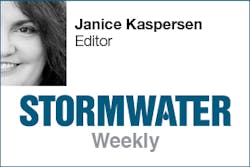
This is a bit off the topic of stormwater, strictly speaking, but it does deal with how people understand scientific concepts and the scientific process—people, for example, like the public to whom we explain why we need to pay for stormwater management.
This recent article questions what we mean by “scientific literacy.” How well are people able to judge whether the assertion of a politician or of someone selling a product or idea has scientific merit? Does the number of likes or retweets lend more credibility to an idea? For many people, it seems, it certainly does, and misinformation spreads quickly.
This is a bit off the topic of stormwater, strictly speaking, but it does deal with how people understand scientific concepts and the scientific process—people, for example, like the public to whom we explain why we need to pay for stormwater management. This recent article questions what we mean by “scientific literacy.” How well are people able to judge whether the assertion of a politician or of someone selling a product or idea has scientific merit? Does the number of likes or retweets lend more credibility to an idea? For many people, it seems, it certainly does, and misinformation spreads quickly. [text_ad] The article’s author, Cynthia Brandenburg, mentions a widely circulated “Science Knowledge Quiz” put out by the Pew Research Foundation. She points out that getting a good score on it really reflects nothing about how well someone understands scientific concepts and applies them to real-world situations. She writes:I couldn’t help but think about the overly simplistic way scientific literacy tends to be framed. Literacy can be broadly understood as the ability to interpret representations of information in complex and nuanced ways, accounting for the multiple meanings that result. By focusing on whether or not enough people know the “right” answers, we are missing something far more important.
Choosing the correct answer to a question from a list of multiple choices hardly indicates the kind of literacy skills necessary to critically evaluate scientific information in the context of society. It is here—at the intersection of scientists and the public—that scientific literacy (or a lack thereof) has its greatest impact, from individual choices related to personal health behaviors to wide-reaching decisions on public policy.
She also points out that it’s important to keep cultural contexts in mind when communicating ideas to the public. Economic, cultural, and a host of other factors can influence how receptive—or not—people are to our ideas of what should be done, and what would be best for them or for the community. I think that’s useful to keep in mind, whether the topic under discussion is a new stormwater utility, a public health policy, or any of 100 other things now up for public debate. As an aside: I agree completely with the author’s assertion that simply identifying the right answers on a science-related quiz isn’t the same as scientific literacy. But, because it can be fun to see how we compare against others, I took the quiz anyway. If you enjoy quizzes too, you can find the one from the Pew Research Center here.The article’s author, Cynthia Brandenburg, mentions a widely circulated “Science Knowledge Quiz” put out by the Pew Research Foundation. She points out that getting a good score on it really reflects nothing about how well someone understands scientific concepts and applies them to real-world situations. She writes:
I couldn’t help but think about the overly simplistic way scientific literacy tends to be framed. Literacy can be broadly understood as the ability to interpret representations of information in complex and nuanced ways, accounting for the multiple meanings that result. By focusing on whether or not enough people know the “right” answers, we are missing something far more important.
Choosing the correct answer to a question from a list of multiple choices hardly indicates the kind of literacy skills necessary to critically evaluate scientific information in the context of society. It is here—at the intersection of scientists and the public—that scientific literacy (or a lack thereof) has its greatest impact, from individual choices related to personal health behaviors to wide-reaching decisions on public policy.
She also points out that it’s important to keep cultural contexts in mind when communicating ideas to the public. Economic, cultural, and a host of other factors can influence how receptive—or not—people are to our ideas of what should be done, and what would be best for them or for the community. I think that’s useful to keep in mind, whether the topic under discussion is a new stormwater utility, a public health policy, or any of 100 other things now up for public debate.
As an aside: I agree completely with the author’s assertion that simply identifying the right answers on a science-related quiz isn’t the same as scientific literacy. But, because it can be fun to see how we compare against others, I took the quiz anyway. If you enjoy quizzes too, you can find the one from the Pew Research Center here.About the Author
Janice Kaspersen
Janice Kaspersen is the former editor of Erosion Control and Stormwater magazines.
